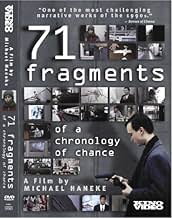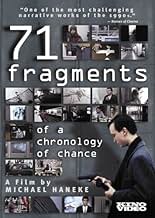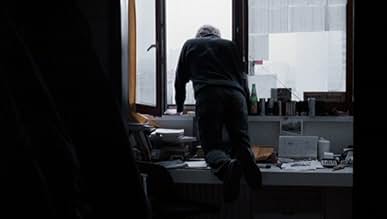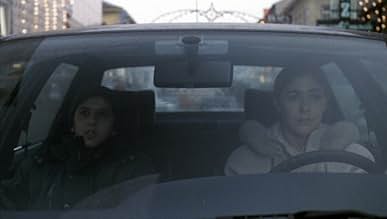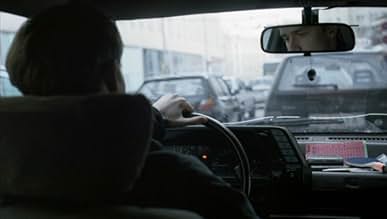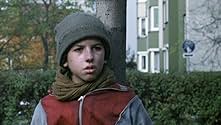IMDb रेटिंग
7.1/10
9.3 हज़ार
आपकी रेटिंग
अपनी भाषा में प्लॉट जोड़ें71 scenes revolving around a recent immigrant, a couple that has just adopted a daughter, a college student and a lonely old man.71 scenes revolving around a recent immigrant, a couple that has just adopted a daughter, a college student and a lonely old man.71 scenes revolving around a recent immigrant, a couple that has just adopted a daughter, a college student and a lonely old man.
- पुरस्कार
- 4 जीत और कुल 1 नामांकन
Michael Jackson
- Self
- (आर्काइव फ़ूटेज)
- (बिना क्रेडिट के)
फ़ीचर्ड समीक्षाएं
A Sample film in 90's about violence and how it improves. Pazzle-like narration with 71 episodes, shows us a story about the history of violence. "71 Fragmente einer Chronologie des Zufalls" has all the signs of a film which could be made in 90's. Haneke is one of the contemporary filmmaker who use the violence scenes to show us how this huge question (why violence?) has no straight answer. 71... is almost look like another haneke's famous film (Code unknown,2000) which both of them are narrating unfinished stories of some journeys. Unexpected final scenes and also, unexpected shocking shots are two icons in this film like another Haneke's films. Haneke's style is like the way Robert bresson made films. Bresson's cinematograph and also Hitchcock's suspense are affected in his cinema. His cinema invites us to watch untold stories about complicated questions of contemporary world.
Before Austrian film director Michael Haneke got well-recognized and appreciated in the international film circuit with such films as "Code Unknown", "Time of the Wolf" and "The Piano Teacher" (all of which were made in France and shown in Cannes), he already made his mark with a number of films made in his native Austria, one of which is this film called "71 Fragments of a Chronology of Chance"(1994). This work is the third installment in the director's "glaciation trilogy" (the other two being "The Seventh Continent" and "Benny's Video"), thus called because of the central theme of the fine line between barbarism and civility in modern urban life being completely, hopelessly blurred. The "barrier" has been broken, so to speak.
As the title suggests, the film consists of 71 "fragments" or vignettes, seemingly random, unrelated and mundane, of various characters going through the motions and vagaries of daily existence in urban Austria. But one can sense that this only seems to be so, as the film's prologue suggests that this is the event that will loom over the succeeding "fragments". And that is, the 1993 Christmas Eve reckless shooting done by a 19-year-old student named only as Maximillian B. inside a bank and on the streets, before eventually shooting himselfone that is purportedly based on a real-life incident.
No explanations or back-stories are provided to the characters and their situations being shown "episodically" on the screen (a Romanian boy refugee, a bank delivery man, an old pensioner, a childless couple and, of course, the student himself). More often than not, a specific fragment is abruptly interrupted or ended by a black fade-out (an alienating technique Haneke once again utilized in the equally visceral and demanding "Code Unknown"). Some fragments happen for not more than a minute, while some last for as long as five or even eight minutes (notably the scene where the student practices ping-pong tennis facing an automated opponent and the scene where the old pensioner argues with his daughter over the phone, both of which vividly displaying a whole gamut of simmering emotions without ever resorting to histrionics). Even reinforcing the clinical, cold approachfor which Haneke is really knownis the utter lack of an accompanying soundtrack and the wordlessness of some scenes.
The sense of dread is punctuated by the ever-present television (as is the case in the two other films in the trilogy), from where a specific world news is being broadcast (like the ethnic war in Somalia and the child abuse charges against pop star Michael Jackson). This is as if to suggest that the looming event foreboded at the film's start is itself to become a subject of a TV news coverage which, albeit small in scale when compared to the news indicated above, is nevertheless not without a lasting cost to the human lives involved, physically, emotionally and psychologically. Having said this, how has the line separating civility and barbarism come to be completely violated in this thought-provoking film?
The trigger shooting perpetrated by the young student, which serves to be the film's denouement, appears to have been done for no apparent reason at all. It's senseless killing in its purest meaning (which arguably is the underlying essence of the middle-class family's suicide in "The Seventh Continent" and the teenage boy's videotaped murder of the girl in "Benny's Video"). And this is what makes the act all the more chilling. It's as if to suggest that such a self-destructive act is inherent in everyone of us, if not what makes up our essence, waiting only to be brought to the surface by a seemingly random and inconsequential spate of events (in "71 Fragments'" case, it's to be rooted in the student's lack of enough cash to pay for his car gas).
And when the "event" does finally happen, rather than to serve as an important food-for-thought, it's sadly reduced to no more than a piece of media sensation, regarded as the hot "news of the day", focusing more on "what" happened than on "why" did it happen. The alarming incident thus becomes another piece of media entertainment, to be savored by mass consumers who always crave for what is sensational and controversial, without ever thinking of its deep-rooted incitations and implications. (This is a thought which Haneke is to delve full-blown in "Funny Games", both the Austrian and American versions, though I really prefer the first one.)
If in Polish auteur Krzysztof Kieslowski's world, chance incidents and fateful encounters are all part of a grand design to convey deep layers of human emotional truths (like in the truly majestic "Three Colors" trilogy), in Haneke's (or at least in the world of "71 Fragments"), such randomness is to be put in order by an inherent barbarism that's only barely creeping out of the human psyche.
As the title suggests, the film consists of 71 "fragments" or vignettes, seemingly random, unrelated and mundane, of various characters going through the motions and vagaries of daily existence in urban Austria. But one can sense that this only seems to be so, as the film's prologue suggests that this is the event that will loom over the succeeding "fragments". And that is, the 1993 Christmas Eve reckless shooting done by a 19-year-old student named only as Maximillian B. inside a bank and on the streets, before eventually shooting himselfone that is purportedly based on a real-life incident.
No explanations or back-stories are provided to the characters and their situations being shown "episodically" on the screen (a Romanian boy refugee, a bank delivery man, an old pensioner, a childless couple and, of course, the student himself). More often than not, a specific fragment is abruptly interrupted or ended by a black fade-out (an alienating technique Haneke once again utilized in the equally visceral and demanding "Code Unknown"). Some fragments happen for not more than a minute, while some last for as long as five or even eight minutes (notably the scene where the student practices ping-pong tennis facing an automated opponent and the scene where the old pensioner argues with his daughter over the phone, both of which vividly displaying a whole gamut of simmering emotions without ever resorting to histrionics). Even reinforcing the clinical, cold approachfor which Haneke is really knownis the utter lack of an accompanying soundtrack and the wordlessness of some scenes.
The sense of dread is punctuated by the ever-present television (as is the case in the two other films in the trilogy), from where a specific world news is being broadcast (like the ethnic war in Somalia and the child abuse charges against pop star Michael Jackson). This is as if to suggest that the looming event foreboded at the film's start is itself to become a subject of a TV news coverage which, albeit small in scale when compared to the news indicated above, is nevertheless not without a lasting cost to the human lives involved, physically, emotionally and psychologically. Having said this, how has the line separating civility and barbarism come to be completely violated in this thought-provoking film?
The trigger shooting perpetrated by the young student, which serves to be the film's denouement, appears to have been done for no apparent reason at all. It's senseless killing in its purest meaning (which arguably is the underlying essence of the middle-class family's suicide in "The Seventh Continent" and the teenage boy's videotaped murder of the girl in "Benny's Video"). And this is what makes the act all the more chilling. It's as if to suggest that such a self-destructive act is inherent in everyone of us, if not what makes up our essence, waiting only to be brought to the surface by a seemingly random and inconsequential spate of events (in "71 Fragments'" case, it's to be rooted in the student's lack of enough cash to pay for his car gas).
And when the "event" does finally happen, rather than to serve as an important food-for-thought, it's sadly reduced to no more than a piece of media sensation, regarded as the hot "news of the day", focusing more on "what" happened than on "why" did it happen. The alarming incident thus becomes another piece of media entertainment, to be savored by mass consumers who always crave for what is sensational and controversial, without ever thinking of its deep-rooted incitations and implications. (This is a thought which Haneke is to delve full-blown in "Funny Games", both the Austrian and American versions, though I really prefer the first one.)
If in Polish auteur Krzysztof Kieslowski's world, chance incidents and fateful encounters are all part of a grand design to convey deep layers of human emotional truths (like in the truly majestic "Three Colors" trilogy), in Haneke's (or at least in the world of "71 Fragments"), such randomness is to be put in order by an inherent barbarism that's only barely creeping out of the human psyche.
An excellent movie that took my breath away. Haneke forces us to view television like we view film. He has no answers but throws us many questions. One of many things this movie shows us is how we stop to listen to the violence the news presents for us every day. We has almost come to the point that we need the films storytelling to get involved, but even then do we act?
If you're looking for something happy, uplifting, and fun then steer clear of this movie. If you're looking for something easy and simple then steer clear of this movie. If you're looking for something that you can watch with half a brain then avoid this movie like the plague. 71 Fragments of a Chronology of Chance is an experimental film from visionary mastermind Michael Haneke. The film is 71 different scenes that highlight small tidbits of the lives a seemingly random collection of people. News clips of war and Michael Jackson are spliced into the film as well, creating a disjointed and difficult narrative that in some ways all ties together, but in other ways stays loose and frivolous. The interpretation of this kind of narrative style is at the viewers discretion.
If you're at all familiar with Haneke's work then you'll know not to expect anything straightforward going into this film. If you go into this film knowing nothing about Haneke then may God have mercy on your soul. Not really, just be prepared. This is not an easy film to follow being that there seems to not be much to follow. The majority of the film spends its time laying down the various puzzle pieces with very little rhyme or reason to the distribution of the pieces. Towards the end of the film the pieces begin coming together for a fairly anticlimactic ending that reflects the perpetual sadness of a world full of violence, hardship, neglect, and hatred. You'll never miss Haneke's macabre cynicism in any of this films, and especially not this one.
It's difficult for me to form a steadfast opinion on this film because it is so out there and so difficult to fully comprehend. As always, I respect Michael Haneke for the being the true genius he is. He's created something wholly original and intuitive here, I just can't quite place what it is. There are a lot of lines going in different directions here and they never seem quite seem to meet up. This film challenges the ideas of your typical film narrative and I have to give it kudos for taking such risks and ending up with something that works more or less. 71 Fragments of a Chronology of Chance isn't a film you just watch, it's something you experience.
If you're at all familiar with Haneke's work then you'll know not to expect anything straightforward going into this film. If you go into this film knowing nothing about Haneke then may God have mercy on your soul. Not really, just be prepared. This is not an easy film to follow being that there seems to not be much to follow. The majority of the film spends its time laying down the various puzzle pieces with very little rhyme or reason to the distribution of the pieces. Towards the end of the film the pieces begin coming together for a fairly anticlimactic ending that reflects the perpetual sadness of a world full of violence, hardship, neglect, and hatred. You'll never miss Haneke's macabre cynicism in any of this films, and especially not this one.
It's difficult for me to form a steadfast opinion on this film because it is so out there and so difficult to fully comprehend. As always, I respect Michael Haneke for the being the true genius he is. He's created something wholly original and intuitive here, I just can't quite place what it is. There are a lot of lines going in different directions here and they never seem quite seem to meet up. This film challenges the ideas of your typical film narrative and I have to give it kudos for taking such risks and ending up with something that works more or less. 71 Fragments of a Chronology of Chance isn't a film you just watch, it's something you experience.
As a massive Haneke fan, 71 Fragments and Time of the Wolf were the only films of his I had left to see. I ticked 71 Fragments off last night and was left feeling slightly underwhelmed. It isn't a bad film or anything, it's just very pedestrian for Michael. It lacks the emotional power of The Seventh Continent, the shock of Benny's Video and the technical skill of Code Unknown, yet it resembles all three. If those three films had a hideously depressing threesome, then 71 Fragments would probably be its mediocre child.
Thankfully it's not as horrifyingly boring as The Castle or the second half of Benny's Video, even though the plot description sounds like it could be. It follows about four unrelated characters going about their everyday business. There's a ping ponging student, a stowaway boy, a depressed couple and a lonely Granddad. Haneke gives us very brief snapshots of their lives which is reminiscent of Code Unknown and Happy End, although not as focused or engaging. I didn't find any of it boring, just a little bit repetitive. The ending also isn't as shocking as it would like to think it is.
So in the end, it's a well-made little film which some interesting themes and the odd great scene, however it's not worth going out of your way to find. To my mind, Haneke's greatest films are: Amour, The Piano Teacher and Hidden.
Thankfully it's not as horrifyingly boring as The Castle or the second half of Benny's Video, even though the plot description sounds like it could be. It follows about four unrelated characters going about their everyday business. There's a ping ponging student, a stowaway boy, a depressed couple and a lonely Granddad. Haneke gives us very brief snapshots of their lives which is reminiscent of Code Unknown and Happy End, although not as focused or engaging. I didn't find any of it boring, just a little bit repetitive. The ending also isn't as shocking as it would like to think it is.
So in the end, it's a well-made little film which some interesting themes and the odd great scene, however it's not worth going out of your way to find. To my mind, Haneke's greatest films are: Amour, The Piano Teacher and Hidden.
क्या आपको पता है
- ट्रिवियाFilm debut of Sebastian Stan.
- गूफ़When Tomek (Otto Grünmandl) makes himself dinner, around the 20 minutes mark, there's a mirror in the background that reflects the boom mic.
- कनेक्शनFeatured in Mein Leben: Michael Haneke (2009)
टॉप पसंद
रेटिंग देने के लिए साइन-इन करें और वैयक्तिकृत सुझावों के लिए वॉचलिस्ट करें
- How long is 71 Fragments of a Chronology of Chance?Alexa द्वारा संचालित
विवरण
- रिलीज़ की तारीख़
- कंट्री ऑफ़ ओरिजिन
- भाषाएं
- इस रूप में भी जाना जाता है
- 71 Fragments of a Chronology of Chance
- फ़िल्माने की जगहें
- उत्पादन कंपनियां
- IMDbPro पर और कंपनी क्रेडिट देखें
- चलने की अवधि1 घंटा 40 मिनट
- रंग
- पक्ष अनुपात
- 1.66 : 1
इस पेज में योगदान दें
किसी बदलाव का सुझाव दें या अनुपलब्ध कॉन्टेंट जोड़ें

